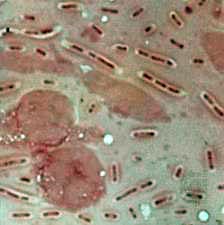
Klebsiella pneumoniae gram stainKlebsiella pneumoniae is a member of the Enterobacteriaceae family of bacteria. This is a rod-shaped, not movable, gram-negative bacteria. Klebsiella is known for its polysaccharide capsule that surrounds the entire organism known, making treatment very difficult Klebsiella pneumoniae. The capsule tends to be the bacteria are associated with resistance to most antibiotics.
All members of the genus Klebsiella show two types of antigens, lipopolysaccharide (O-antigens) and capsular polysaccharide (K antigen). These antigens help the organisms their pathogenicity. Klebsiella pneumoniae is an opportunistic pathogen that is in the environment and the mucous membranes of mammals. It is a major cause of community-acquired pneumonia in the elderly. Let us into the details of the Klebsiella pneumoniae symptoms go and look at the treatment options available in the following sections. Klebsiella pneumoniae: General OverviewK. pneumoniae is a facultative anaerobic, gram-negative organism. This means that they can survive under aerobic conditions (with oxygen) or anaerobic (without oxygen). It is in soil and water and is therefore found on fruits and vegetables. In humans, these organisms on the skin, throat and gastrointestinal tract are found. As already mentioned, they cause opportunistic infections and infections are in people with diabetes, chronic lung disease, weak immune system and chronic alcoholism. It is known to cause nosocomial infections in hospital patients with weak immune systems. The K. pneumoniae, treatment options are very limited because these organisms are resistant to most antibiotics used. When K. pneumoniae, the lungs, it causes necrosis, inflammation and bleeding of the lung tissue. They can be thick and bloody sputum, which is described as "currant jelly sputum". Klebsiella pneumoniae: SymptomsKlebsiella pneumoniae usually infects a patient who has had a bout of flu and colds. The virus infection provides the bacteria an opportunity to infect the respiratory system and lead to an infection. Klebsiella pneumonia are similar to the symptoms of colds. The propensity to most people to ignore the infection and not to help a doctor immediately. The symptoms of pneumonia are as follows - Klebsiella pneumoniae: TreatmentThe doctor will perform a Gram staining method together with other biochemical analysis of bacteria to identify the pneumonia. Once the diagnosis is made, the doctor will examine the treatment options, as very few are available. This is because the organism is resistant to most drugs. The patient is antibiotics such as aminoglycosides and cephalosporins are given. In some cases, the organism has chromosomal class A beta-lactamase. This makes it resistant to ampicillin. Other strains are beta-lactamase that make them resistant to amoxicillin extended, carbenicillin, and ceftazidime. Thus, only aminoglycosides and cephalosporins against Klebsiella pneumoniae proved. Systemic infections with amikin, tobramycin clavulanate, aztreonam, gentamicin and other third-generation antibiotics treatment. Klebsiella pneumoniae causes a necrotic alveolar destruction in susceptible patients. Mortality from Klebsiella pneumoniae infection is as high as 50%. The mortality is high despite the use of antimicrobial therapy. People who are alcoholics or suffer bacteremia show 100% mortality. It can lead to emphysema, lung abscess and pulmonary gangrene, that surgery is necessary. As you can see, is not very effective in treating Klebsiella pneumoniae. Wash your hands thoroughly to help prevent transmission of the bacteria. The third generation cephalosporin antibiotics, fluoroquinolones, etc. can help to treat this infection. It was all about the treatment of Klebsiella pneumoniae. You should talk with their doctor in detail about pneumonia and its prognosis in cases of antibiotic-resistant bacterial infections.
|
|
© 2014 "klebsiella-pneumoniae.org". All Rights Reserved |
